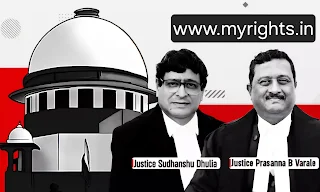The High Court should not hesitate to cancel those criminal proceedings that are essentially of civil nature: Supreme Court

The Supreme Court reiterated that the High Court should cancel the prosecution on the basis of criminal complaints generated from civil transactions using its inherent power.
The court said the example, referring to Paramjit Batra vs Uttarakhand State (2013) 11 SCC 673,
“… Although the underlying powers of the High Court should be used in a restrained manner under Section 482 of the Criminal Procedure Code. The High Court should not hesitate to cancel such criminal proceedings, which are essentially of civil nature.”
A division bench of Justice Sudhanshu Dhulia and Justice PB Varlet reversed the High Court’s decision, saying that the criminal case arising out of civil transactions against the accused, can cancel the action arising from the High Court Civil Transactions, as the procedure would be misused due to the absence of criminal intentions.
The High Court, in its judgment, refused to cancel the pending criminal case against the appellant/accused.
The decision written by Justice Sudhanshu Dhulia said, “Usha Chakraborty and other vs. West Bengal state and others, while relying on the state of West Bengal and others, was again believed that where the dispute which is essentially of civil nature, is given a criminal offense, then such disputes can be canceled using the underwriting powers under Section 482 of the Criminal Procedure Code.”
The essence of the dispute is that under sections 406, 420 and 506 of the Indian Penal Code, a complaint was filed against the accused/appellant for paying only Rs 62 lakh against the entire amount. 1,01,58,574/- to assemble a bicycle to the complainant. The allegation against the appellant/accused is that he cheated the complainant intentionally by cheating the complainant to assemble more bicycles without paying the assembling fee for more bicycles assembled by the complainant.
After finding out that the dispute between the parties is a completely civil dispute arising out of civil transactions, where an agreement was also being reached between the parties, in which the complainant admitted that he received an additional amount from the accused/appellant, the Supreme Court found that “this is a case where this is the case where the underlying forces under the Criminal Procedure Code should use the inherent powers by the High Court, as the powers should prevent the purpose of preventing and securing the purpose of the process.
The Supreme Court said,
“We do not agree with the findings drawn by the High Court for two reasons. First, the dispute between the parties is primarily of civil nature. Finally, the question is the question of how many bicycles the complainant gathered and the dispute is between whom, the parties are only in relation to the figures of bicycles and the amount to be paid as a result. This is not a civil dispute to establish the complainant that the complainant is not able to establish the complainant from the earliest. It is only because the appellants admitted that only 28,995 bicycles were collected, but they paid an amount of Rs 62,01,746/- to the complainant, which is a large number of bicycles, it will not prove that the appellaters intend to cheat from the beginning. ”
The Supreme Court, while relying on his earlier decision of Paramjit Batra vs Uttarakhand state, said that the High Court should not hesitate to cancel such criminal proceedings arising from civil nature.
The Supreme Court was held in Paramjeet Batra,
“Civil transactions can also be a criminal form of complaints. But the High Court must see whether the dispute, which is essentially of civil nature, is wearing a criminal offense. In such a situation, if any civil treatment is available and in fact, as it was, as adopted, the High Court should not mandate to stop the criminal proceedings to prevent the court process.”
Furthermore, the court clarified that every violation of the contract would not essentially lead to the crime of fraud, unless the complainant has shown fraud or dishonest intentions from the accused since the formation of the contract.
The Supreme Court said,
“In the current case, the dispute between the parties is not only essentially of civil nature, but the dispute in this matter is resolved later, as we have already discussed above. We do not see any criminal element here. As a result, there is nothing but misuse of the case process here.”
Accordingly, the appeal was allowed and the pending criminal proceedings against the accused were canceled.
Case title: Naresh Kumar and others vs. Karnataka state and others.


